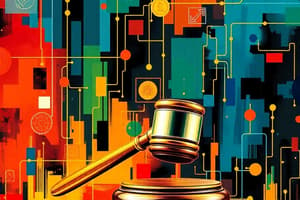Podcast
Questions and Answers
According to the lecture, what is one of the key shifts in the role of the state related to regulation?
According to the lecture, what is one of the key shifts in the role of the state related to regulation?
- From promoting economic growth to focusing solely on social welfare.
- From direct resource allocation to steering and influencing. (correct)
- From centralized control to complete deregulation.
- From enforcing strict laws to only providing advisory services.
Which of the following exemplifies 'Economic regulation' as an approach to regulation?
Which of the following exemplifies 'Economic regulation' as an approach to regulation?
- Awarding and reviewing licenses. (correct)
- Reputational incentives.
- Mandatory codes of practice.
- Rules and Mandatory guidance.
What is meant by the term 'regulatory capture'?
What is meant by the term 'regulatory capture'?
- The act of capturing illegal market activities by regulatory bodies.
- The control of regulatory agencies by the industries they are meant to regulate. (correct)
- The simplification of complex regulations for public understanding.
- The process of regulators exceeding their legal authority.
According to the lecture, what is a major concern regarding the increasing number of regulators, auditors and inspectors?
According to the lecture, what is a major concern regarding the increasing number of regulators, auditors and inspectors?
Which of the following is a primary characteristic of the 'regulatory state'?
Which of the following is a primary characteristic of the 'regulatory state'?
What is a potential disadvantage of regulation?
What is a potential disadvantage of regulation?
How does the lecture describe the focus of regulators' independence?
How does the lecture describe the focus of regulators' independence?
What characterizes Traditional Public Administration (TPA) in the context of regulation?
What characterizes Traditional Public Administration (TPA) in the context of regulation?
According to the lecture, what is a key factor driving the 'rise of regulators'?
According to the lecture, what is a key factor driving the 'rise of regulators'?
What is the primary concern regarding 'under-regulation'?
What is the primary concern regarding 'under-regulation'?
Voluntary codes of practice typically fall under which approach to regulation?
Voluntary codes of practice typically fall under which approach to regulation?
In the context of regulation, what does NPM (New Public Management) primarily advocate?
In the context of regulation, what does NPM (New Public Management) primarily advocate?
Which factor explains the EU's role as a regulatory state?
Which factor explains the EU's role as a regulatory state?
What is a key consideration regarding regulation in the Global South?
What is a key consideration regarding regulation in the Global South?
What does the lecture suggest about the effectiveness of regulation?
What does the lecture suggest about the effectiveness of regulation?
What characterizes Self-regulation?
What characterizes Self-regulation?
What does independence bring to regulators?
What does independence bring to regulators?
Why might providing regulatory objectives be problematic?
Why might providing regulatory objectives be problematic?
What did Walby say about state power?
What did Walby say about state power?
Is regulation on the rise?
Is regulation on the rise?
Which of these institutions does not regulate universities in the UK?
Which of these institutions does not regulate universities in the UK?
Which approach is the most prescriptive?
Which approach is the most prescriptive?
Which is the least prescriptive approach to regulation?
Which is the least prescriptive approach to regulation?
Which one is true of The Rise of Regulators
Which one is true of The Rise of Regulators
What aggravates the problem of regulatory capture?
What aggravates the problem of regulatory capture?
Why may regulation be considered a paradox
Why may regulation be considered a paradox
What is an element of governance?
What is an element of governance?
Which of these is a disadvantage of regulation?
Which of these is a disadvantage of regulation?
In which area is external pressure most relevant?
In which area is external pressure most relevant?
What is a key question to ask about regulation?
What is a key question to ask about regulation?
Which of these is not a listed reason for the rise of regulators?
Which of these is not a listed reason for the rise of regulators?
When did regulation begin to rise?
When did regulation begin to rise?
In which ways do governments exert control?
In which ways do governments exert control?
Under which model does promotion of the public interest fall?
Under which model does promotion of the public interest fall?
What is the most limited scope out of these?
What is the most limited scope out of these?
What is one of the Key explanations?
What is one of the Key explanations?
Who mentioned the Accountability of regulators?
Who mentioned the Accountability of regulators?
When discussing EU rigid budgets, who was mentioned?
When discussing EU rigid budgets, who was mentioned?
There has been a delay in what, in the Global South?
There has been a delay in what, in the Global South?
Flashcards
State Power
State Power
State power exercised through a regulatory framework, instead of monopolizing violence or providing welfare.
Regulatory Capture
Regulatory Capture
A situation where regulatory agencies are controlled by the industries they are supposed to regulate.
Regulatory Overload
Regulatory Overload
The army of regulators, auditors, inspectors, and watchdogs that preside over every nook and cranny of the public realm.
Self-Regulation
Self-Regulation
Signup and view all the flashcards
Regulation
Regulation
Signup and view all the flashcards
Rise of regulatory agencies
Rise of regulatory agencies
Signup and view all the flashcards
Regulation in the Global South
Regulation in the Global South
Signup and view all the flashcards
Conclusion
Conclusion
Signup and view all the flashcards
Tradition Public Administration (TPA)
Tradition Public Administration (TPA)
Signup and view all the flashcards
New Public Management (NPM)
New Public Management (NPM)
Signup and view all the flashcards
Study Notes
- Lecture 6 is on regulation.
Defining Regulation
- Defining regulation is a difficult task.
- The state has moved from providing and distributing to steering.
- There are three types of meaning of regulation, from narrow to broader understanding.
- Regulation relies on institutions operating at arm's length, such as regulatory agencies.
- Regulation includes all mechanisms of social control.
- Regulation includes all efforts to steer the economy.
- Regulation includes an authoritative set of rules and mechanisms.
Regulation and Public Administration
- TPA (Traditional Public Administration) involves hierarchical, direct state control.
- NPM (New Public Management) includes restricting state regulation of the economy.
- NPM promotes public interest in cases of market failure or abuse.
- NPM creates new regulatory authorities (including supranational ones).
- More prescriptive regulation includes command and control regulation, and economic regulation.
- Lighter-touch and non-regulatory approaches include enforced self-regulation and voluntary self-regulation.
Governance and State Power
- State power is exercised through a regulatory framework, rather than monopolizing violence or providing welfare.
- There is a new regulatory state and self-regulation.
- There are 6 reasons for the 'rise of regulators': privatization, political protest, loss of trust, government initiatives, pressure from sectors, and new ethical problems (Brooke, 2003).
The Rise of Regulators
- Brooke identified 6 types of regulators in 2003.
- The old style public protection agencies
- The economic regulators
- Regulators of organizations
- Ethical regulators in science
- Professional regulators
- Regulators of regulators
- The Better Regulation Task Force is in the Cabinet Office.
Regulatory Independence
- Regulators can make decisions with little or no ministerial oversight.
- Regulation shifts the locus of control from state to regulatory body.
- A key focus is independence, including flexibility, being informed and impartial.
- Speaking truth to power and gaining legitimacy are key.
- Maintaining business confidence is important.
University Regulation in the UK
- HEFCE funds the quality of research and teaching.
- RCUK funds research and PGR training.
- The Office for Students
- The Competition and Marketing Authority
- QAA ensures quality of education.
- The Higher Education Academy improves teaching quality.
- The National Student Survey
- The Office of Fair Access ensures access.
- HESA collects data.
- The Office for Student Loans
- The independent adjudicator handles appeals.
- The Health and Safety Executive
- Professional accreditation bodies
- UKBA handles student visas.
Regulatory Overload
- Concerns exist about regulatory overload and accountability.
- There is an issue about the accountability of regulatory bodies themselves.
- It's unclear who regulates the regulators, audits the auditors, and inspects the inspectors.
- It's unclear who pulls this whole system together into some sort of coherent shape.
- Dr Tony Wright stated in 2003 that "the short answer is that nobody does."
Government Control
- Government influences regulation through policy frameworks.
- Government provides regulatory objectives that might be conflicting.
- For example, the case of Ofgem.
- Government provides guidance on priorities.
- Government appoints senior regulatory staff.
- Government uses resources to control regulation.
Regulatory Capture
- Regulatory agencies can be controlled by the industry they are charged with regulating.
- There may be special interests.
- Aggravating factors include capacity, corruption, and lack of transparency.
- The focus needs to be on capture as a process.
- An example is the Vioxx drug scandal (Heims & Moxon, 2023).
Under-regulation and Self-regulation
- Under-regulation occurs with technological advances and issues with keeping up.
- Self-regulation is when those to whom regulations apply are responsible for devising, maintaining and enforcing regulation' (Bevir, 2009: 172)
The Case for Regulation
- Advantages of regulation include precision, limited information required, and being inexpensive.
- Regulation is equitable (applying to all).
- Regulation can provide public legitimacy (e.g. through democratic process).
- There is a paradox.
- Disadvantages include neoliberal critique, potentially blunt instrument, and a weak state.
- Weak infrastructure can lead to poor compliance.
- Regulation can serve public interest or private interests.
Regulatory State Debate
- Is the rise of regulatory bodies a new form of state?
- It can be argued that regulatory agencies have significantly increased their power at the expense of the state.
- It can also be argued that the state relinquished control in less important areas.
The EU as a Regulatory State
- The EU functions as a 'regulatory state' (Majone, 1994).
- Factors include a rigid EU budget.
- The EC increased influence and competencies.
- MNCs prefer uniform rules.
- There is low credibility of inter-governmental agreements.
- The EU engages in market creation and management of externalities.
Regulation in the Global South
- There was a delay in institution-building in the 1990s-2000s.
- Western models were applied.
- Regulatory authority emerged, but was not depoliticised or fully independent.
- There is a high social salience of essential infrastructure, and incomplete markets.
- There are powerful external pressures.
- Redistributive politics creates winners and losers.
Conclusion
- Regulation has risen since the 1980s.
- Regulation attempts to create an impression of small government and free markets.
- Regulation remains problematic and contradictory.
- Whether regulation works in practice is a serious question and context matters.
Studying That Suits You
Use AI to generate personalized quizzes and flashcards to suit your learning preferences.



